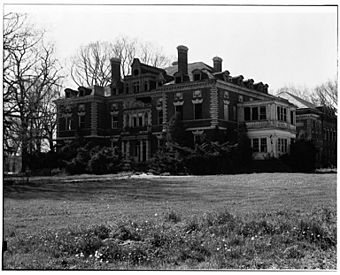Thomas Indian School facts for kids
Quick facts for kids |
|
|
Thomas Indian School
|
|

Thomas Indian School Administration Building, 1981
|
|
| Location | NY 438 on Cattaraugus Reservation, Irving, New York |
|---|---|
| Built | 1900 |
| Architectural style | Georgian Revival |
| NRHP reference No. | 73001188 |
| Added to NRHP | January 25, 1973 |
The Thomas Indian School was a special school and a historic area located near Irving. It was part of the Cattaraugus Indian Reservation in Erie County, New York. This school was also known as the Thomas Asylum of Orphan and Destitute Indian Children.
It first opened in 1855. Missionaries Asher Wright and his wife Laura Wright started it. They wanted to provide a home for Seneca children who were orphans or in need. The school aimed to teach these children new ways of life.
The main buildings were built around 1900 by New York State. They were designed by a company called Barney and Chapman from New York City. The campus had red brick buildings in the Georgian Revival style. It also had many buildings for farming and learning trades.
Contents
A Special Place in History
The Thomas Indian School is recognized as an important historical site. It was added to the National Register of Historic Places in 1973. This means it is a place with special historical value.
Understanding Boarding Schools
The Thomas Indian School was one of many Native American boarding schools. These schools were set up to educate Native American children. They aimed to teach children skills and a different way of life.
Stories from the Schools
Many people have shared their experiences from these schools. Their stories help us understand what life was like there. These stories show the impact these schools had on Native American communities.
Learning from the Past
There are films and collections that share these stories. For example, the film Unseen Tears: A Documentary on Boarding School Survivors tells some of these experiences. The Legacy of Hope Foundation also has an online collection called "Where are the Children?". These resources help us learn about the past. They also show how communities work to heal and grow stronger.
 | William Lucy |
 | Charles Hayes |
 | Cleveland Robinson |



